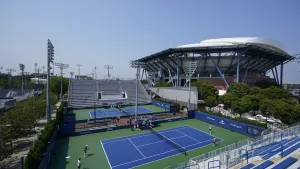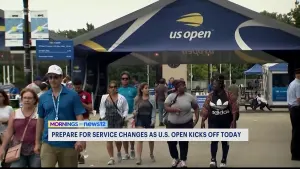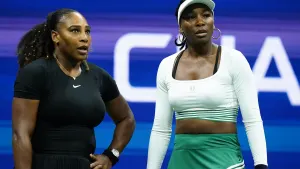More Stories
Walking out for his first Grand Slam final at age 19, Carlos Alcaraz bumped fists with fans leaning over a railing along the path leading to the Arthur Ashe Stadium court. Moments later, after the coin toss, Alcaraz turned to sprint to the baseline for the warmup, until being beckoned back to the net by the chair umpire for the customary pre-match photos.
Alcaraz is imbued with boundless enthusiasm and energy, not to mention skill, speed, stamina and sangfroid. And now he’s a U.S. Open champion and the No. 1 player in men’s tennis.
Using his uncommon combination of moxie and maturity, Alcaraz beat Casper Ruud 6-4, 2-6, 7-6 (1), 6-3 on Sunday to both earn the trophy at Flushing Meadows and become the youngest man to lead the ATP rankings.
“Everything came so fast. For me it’s unbelievable. It’s something I dreamed since I was a kid, since I started playing tennis," said Alcaraz, whom folks of a certain age might still consider a kid.
“Of course,” he said, “I’m hungry for more."
Alcaraz, who will move up three ranking spots from No. 4 on Monday, already has attracted plenty of attention as someone considered the Next Big Thing in a sport dominated for decades by the Big Three of Rafael Nadal, Novak Djokovic and Roger Federer.
“He's one of these few rare talents that comes up every now and then in sports. That’s what it seems like,” said Ruud, a 23-year-old from Norway. “Let’s see how his career develops, but it’s going all in the right direction.”
The Spaniard was serenaded by choruses of “Olé, Olé, Olé! Carlos!” that reverberated off the arena's closed roof - and Alcaraz often motioned for the spectators to get louder. There were a couple of magical points that drew standing ovations, including one Alcaraz lost with a laser of an on-the-run forehand while ending up face-down on his belly.
He only briefly showed signs of fatigue from having to get through three consecutive five-setters in the three rounds right before the final; no one had gone through that arduous a route on the way to the title in New York in 30 years.
Alcaraz went five sets against 2014 U.S. Open champion Marin Cilic in the fourth round, ending at 2:23 a.m. Tuesday; against Jannik Sinner in the quarterfinals, a 5-hour, 15-minute thriller that ended at 2:50 a.m. Friday after Alcaraz needed to save a match point; and against Frances Tiafoe in the semifinals.
“It’s not time to be tired,” Alcaraz said.
This was not a stroll to the finish. He faced a pair of set points while down 6-5 in the third. Could have been an outcome-altering moment.
But Alcaraz erased each of those point-from-the-set opportunities for Ruud with the sorts of quick-reflex, soft-hand volleys he repeatedly displayed.
“He just played too good on those points. We’ve seen it many times before: He steps up when he needs to,” Ruud said. “When it’s close, he pulls out great shots.”
One break in the fourth was all it took for Alcaraz to seal the victory in the only Grand Slam final between two players seeking both a first major championship and the top spot in the ATP’s computerized rankings, which date to 1973.
The winner was guaranteed to be first in Monday's rankings; the loser was guaranteed to be second.
“We knew what was at stake,” said Ruud, who entered the U.S. Open ranked No. 7. “I'm disappointed, of course, that I'm not No. 1, but No. 2 is not too bad, either.”
He also was the runner-up to Nadal at the French Open in June.
If nothing else, Ruud gets the sportsmanship award for conceding a point he knew he didn’t deserve. It came at 4-3 in the first set, when he raced to a short ball that bounced twice before his racket touched it. Play continued, and Alcaraz hesitated, then flubbed his response. Ruud told the chair umpire what had happened, giving the point to Alcaraz, who responded with a thumbs-up.
Alcaraz certainly seems to be a rare talent, possessing an all-court game, a blend of groundstroke power with a willingness to push forward. He won 34 of the 45 points that he finished at the net.
He is increasingly a threat while serving - he delivered 14 aces at up to 128 mph - and returning, earning 11 break points, converting three.
And, as Ruud noted, Alcaraz showed “incredible fighting spirit and will to win.”
Make no mistake: Ruud is no slouch. There’s a reason he is the youngest man since Nadal to get to two major finals in one season.
But this was Alcaraz's time to shine under the lights.
Some perspective: He is the first teenager to win the U.S. Open since Pete Sampras in 1990, the first to triumph at any Slam since Nadal at the 2005 French Open.
Decent company.
Another way to understand how precocious Alacaraz is: The last man to win this tournament by his second appearance was Pancho Gonzalez in 1948, before pros were allowed into the field.
For context on the rankings, it is helpful to know that Novak Djokovic did not play at the U.S. Open or Australian Open this year, unable to enter those countries because is not vaccinated against COVID-19, and did not receive any ranking boost for his Wimbledon championship because no points were on offer for anyone after the All England Club banned athletes from Russia and Belarus over the invasion of Ukraine.
Regardless of the circumstances, it is significant that Alcaraz is the first male teenager at No. 1.
No one else did it. Not Nadal, not Djokovic, not Federer, not Sampras or anyone else.
When one last service winner glanced off Ruud's frame Sunday, Alcaraz dropped to his back on the court, then rolled over onto his stomach, covering his face with his hands.
He went into the stands for hugs with his coach Juan Carlos Ferrero, a former No. 1 himself who won the French Open in 2003 and reached the final of that year's U.S. Open, and others, crying all the while.
“He was born to play this kind of tournament, born to play these kind of matches,” said Ferrero, who has worked with Alcaraz for three years. “Since the moment that I started with him, I saw some things that were different than the other guys at his age.”
You only get to No. 1 for the first time once.
You only win a first Grand Slam title once.
Many folks expect Alcaraz to be celebrating these sorts of feats for years to come.
“I want to be (at) the top for many, many weeks - I hope many years,” he said. “I’m going to work hard again after this week, these amazing two weeks. I’m going to fight (to) have more of this.”
By HOWARD FENDRICH
More from News 12
1:48

How to enjoy the US Open - even if you aren't a tennis fan
1:02

US Open celebrates 50 years of equal pay for men and women
2:05

Guide: Going to the US Open? Here’s all you need to know about parking & transportation
2:05

Guide: Everything you need to know before heading to the US Open
2:05

MTA lays out service changes for US Open
